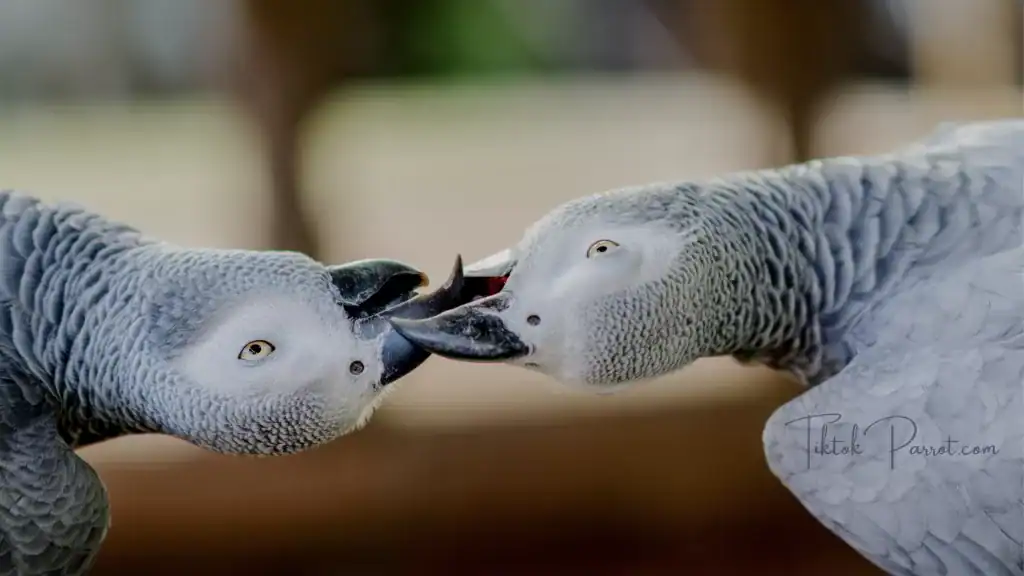African Greys, known for their exceptional intelligence and charming personalities, are popular companions among bird enthusiasts. However, like any pet, they may exhibit behavior problems that can be challenging for owners. In this blog post, we delve into the common behavior problems with African Greys and provide practical solutions for a harmonious relationship.
Discover how to tackle behavior problems in African Greys! Learn effective strategies for a harmonious bond with your intelligent feathered friend.
Understanding African Greys
African Greys are renowned for their ability to mimic human speech and their sociable nature. Owners often underestimate the importance of mental stimulation for these intelligent birds. Failing to meet their mental needs can lead to various behavioral issues.

Common Behavior Problems
- Screaming and Vocalization
- African Greys are expressive and may become loud if not engaged adequately.
- Feather Plucking and Self-Mutilation
- Stress or boredom can trigger self-harming behaviors, affecting their plumage.
- Aggression towards Humans or Other Birds
- Territorial instincts or fear can lead to aggressive behavior.
Root Causes
Understanding the root causes is crucial in addressing behavior problems effectively.
- Lack of Mental Stimulation
- Boredom is a significant factor in behavioral issues.
- Environmental Stressors
- Changes in the environment or household can distress African Greys.
- Health Issues
- Physical discomfort may manifest as behavioral problems.
Addressing Screaming and Vocalization
Positive reinforcement techniques and providing engaging toys can redirect their vocalizations positively.
Tackling Feather Plucking and Self-Mutilation
Identifying triggers, consulting with an avian vet, and introducing distractions can help alleviate these behaviors.
Dealing with Aggression
Understanding triggers, consistent training, and establishing trust are essential in managing aggression.
Importance of Routine Veterinary Check-ups
Regular health assessments and preventive measures contribute to overall well-being.
Creating a Stimulating Environment
Variety in toys and activities, along with rotating cage accessories, prevents boredom.
Positive Reinforcement Training
Reward-based techniques and consistency in training foster positive behavior.
Socialization Tips
Regular interaction with humans and other birds and avoiding isolation are crucial for their mental health.
The Role of Diet
A balanced nutrition plan tailored to African Greys supports mental well-being.
Patience and Consistency
Building a strong bond requires patience and a consistent approach to behavior management.
Case Studies
Real-life examples illustrate how owners successfully addressed behavior problems in their African Greys.
Preventing & Reducing Behavior Problems in African Grey
African Grey parrots are known for their intelligence, sociability, and captivating personalities. However, like any pet, they can develop behavior problems that may challenge their owners.
Owning an African Grey parrot comes with the responsibility of understanding and addressing their unique behavioral needs. These intelligent birds thrive in environments that cater to their natural instincts, and preventing behavior problems is crucial for their overall well-being.
Understanding African Grey Behavior

African Greys, renowned for their mimicry skills and cognitive abilities, exhibit specific behaviors driven by their natural instincts. Common behavior problems include excessive screaming, biting, feather plucking, and territorial aggression. Recognizing these issues is the first step towards finding suitable solutions.
Environmental Factors
The environment plays a significant role in the behavior of African Greys. Ensuring an adequately sized cage, strategically placed within the home, and providing enrichment activities can alleviate stress and promote mental stimulation.
Nutritional Considerations
A well-balanced diet is essential for the physical and mental health of African Greys. Owners should focus on providing a variety of fresh fruits, vegetables, and high-quality pellets while avoiding foods that may be harmful.
Social Interaction
Building a strong bond with your African Grey is key to preventing behavior problems. Regular interaction, positive reinforcement, and allowing your parrot to socialize with other pets contribute to a well-adjusted companion.
Training Techniques
Positive reinforcement is a powerful tool when training African Greys. Addressing specific behavior issues with patience and consistency fosters a positive environment for learning and growth.
Regular Veterinary Check-ups
Regular visits to the avian veterinarian are crucial for monitoring your parrot’s health. Early detection of potential problems can prevent behavior issues stemming from discomfort or illness.
Creating a Routine
African Greys thrive on routine and predictability. Establishing a consistent schedule for feeding, playtime, and sleep provides a sense of security for these intelligent birds.
Toys and Playtime
Engaging toys designed for mental stimulation are essential for preventing boredom-related behavior problems. Incorporating daily playtime into your parrot’s routine ensures they remain physically and mentally active.
Communication Strategies
Understanding African Grey body language is vital for effective communication. Encouraging vocalization without excessive noise and responding to their cues fosters a harmonious relationship.
Handling Aggression
Identifying triggers for aggression and employing gentle handling techniques can help manage and reduce aggressive behavior in African Greys.
Introducing Changes Gradually
African Greys may struggle with adapting to new environments or changes. Introduce alterations gradually, minimizing stress and allowing your parrot to acclimate at their own pace.
Avoiding Common Mistakes
Overreacting to minor issues and impatience in training are common pitfalls. Patience, understanding, and consistency are key elements in fostering a positive relationship with your African Grey.
Case Studies
Real-life examples of behavior improvement showcase successful strategies employed by dedicated parrot owners. Learning from these experiences can provide valuable insights for those facing similar challenges.
My Thoughts
I would say understanding and addressing behavior problems in African Greys require commitment and a holistic approach. Responsible ownership, routine veterinary check-ups, stimulating environments, and by understanding their natural instincts contribute to a harmonious relationship between owners and their feathered companions.
A frequently asked questions (FAQ) about African Grey Parrots!
- Can behavior problems in African Greys be completely eliminated?
- While complete elimination may be challenging, proper care and training can significantly improve behavior.
- While complete elimination may be challenging, proper care and training can significantly improve behavior.
- How often should I take my African Grey for a veterinary check-up?
- If your parrot has no illness at all for months and you see the bird happy and healthy. Then you do not need to take to the vet for check up. However if your bird shows signs of illness then regular check-ups every six months are advisable to catch any potential issues early.
- If your parrot has no illness at all for months and you see the bird happy and healthy. Then you do not need to take to the vet for check up. However if your bird shows signs of illness then regular check-ups every six months are advisable to catch any potential issues early.
- Are there specific toys that African Greys prefer?
- Preferences may vary, but toys that encourage mental stimulation, such as puzzle toys, are often well-received.
- Preferences may vary, but toys that encourage mental stimulation, such as puzzle toys, are often well-received.
- Can diet alone solve behavior problems in African Greys?
- Diet is a crucial aspect, but a holistic approach involving mental and physical well-being is essential.
- Diet is a crucial aspect, but a holistic approach involving mental and physical well-being is essential.
- Is it normal for African Greys to be territorial?
- Yes, territorial behavior is natural; however, proper training can help manage and minimize aggression.
- Yes, territorial behavior is natural; however, proper training can help manage and minimize aggression.
- How can I address excessive screaming in my African Grey?
- Implement positive reinforcement techniques and investigate potential triggers.
- Implement positive reinforcement techniques and investigate potential triggers.
- What should I do if my parrot exhibits territorial aggression?
- Gradually introduce changes, provide ample mental stimulation, and consult with a veterinarian for guidance.
- Gradually introduce changes, provide ample mental stimulation, and consult with a veterinarian for guidance.
- Is it possible to train an older African Grey with established behavior problems?
- Yes, but patience, consistency, and positive reinforcement are crucial for success.
- Yes, but patience, consistency, and positive reinforcement are crucial for success.
- How often should I schedule veterinary check-ups for my African Grey?
- Regular check-ups every 6 to 12 months are recommended to monitor overall health.
- Regular check-ups every 6 to 12 months are recommended to monitor overall health.
- Can I introduce new toys to my parrot’s environment without causing stress?
- Yes, introduce new toys gradually and observe your parrot’s response to minimize stress.
- Yes, introduce new toys gradually and observe your parrot’s response to minimize stress.
- How can I prevent feather plucking in my African Grey?
- Feather plucking may result from boredom or stress. Ensure a stimulating environment, offer a varied diet, and consult with a vet to rule out health issues.
- Feather plucking may result from boredom or stress. Ensure a stimulating environment, offer a varied diet, and consult with a vet to rule out health issues.
- Is it normal for my African Grey to be vocal at night?
- While some vocalization is normal, excessive noise at night may indicate discomfort or anxiety. Check the sleeping environment and consider covering the cage partially for a quieter sleep.
- While some vocalization is normal, excessive noise at night may indicate discomfort or anxiety. Check the sleeping environment and consider covering the cage partially for a quieter sleep.
- What are signs of illness I should watch for in my African Grey?
- Watch for changes in eating habits, lethargy, abnormal droppings, or any signs of distress. Any unusual behavior should prompt a visit to the avian veterinarian.
- Watch for changes in eating habits, lethargy, abnormal droppings, or any signs of distress. Any unusual behavior should prompt a visit to the avian veterinarian.
- Can I teach my African Grey specific tricks or commands?
- Yes, African Greys are highly trainable. Use positive reinforcement to teach tricks or commands, but be patient and consistent in the training process.
- Yes, African Greys are highly trainable. Use positive reinforcement to teach tricks or commands, but be patient and consistent in the training process.
- How do I introduce a new companion to my African Grey?
- Introducing a new bird requires careful planning. Gradually expose them to each other’s scent and presence before direct interaction. Monitor their behavior closely to ensure a positive introduction.
If you found this blog helpful, It would be great if you could share it with your family and friends who might find it useful as well.
You might like to read these as well 🙂
African Grey Behavior: Understanding your Pets
Understanding Your African Grey Parrot Nature and Type
Signs of Illness in an African Grey parrot
How do you handle African Grey Parrot?
African Grey Parrot Temperament
African Grey Parrot’s Nail Biting
How Much Attention Does An African Grey Need?
How Do We Take Care of an African Parrot Grey’s Health?
What causes death in African Grey Parrots?
For more useful content about African grey parrots, you can subscribe my site with your email to get notification upon publishing a new blog, the subscribe box you can see on the right side of this page. Also if you get an alert on your web browser while browsing my site, allow it and that will also give you an alert whenever I publish a new blog. 🙂
Stay safe and much love!



